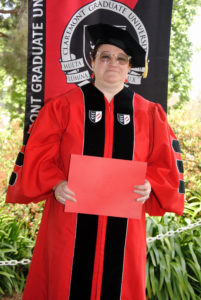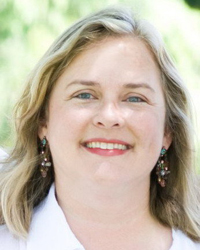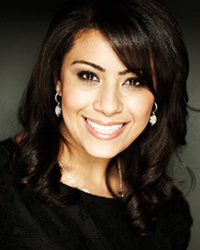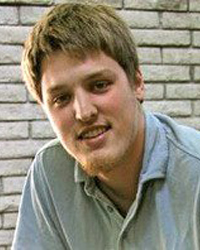Tamara L. Siuda
(PhD ’19)
Dissertation title: “Effective Spirits: Coptic Martyrs and Martyrology”

I came to CGU after a master’s degree in Egyptology at the University of Chicago (2000) and a second master’s in Coptic Studies at Macquarie University (2008). As an Egyptologist I studied philology, or the structure and translation of hieroglyphic texts; during my time at Chicago, I was also exposed to Coptic language as the latest and surviving stage of hieroglyphic Egyptian language. When my doctoral advisor resigned from teaching in order to begin work on an emerging important archaeological excavation, I received a master’s degree from Chicago; several years later, I enrolled at Macquarie University in Australia as one of the first students in their Coptic Studies distance master’s program. At Macquarie I immersed myself in Coptic language and cultural studies, and was introduced to the Australian Coptic community.
At CGU I intended to pursue a Coptic Studies PhD in Coptic music, the subject of my Macquarie master’s, but Dr. Gawdat Gabra convinced me to consider research in the area of Coptic martyrology. Martyrology is of tremendous importance to Coptic Studies, considering that the Coptic Church has always identified itself as a martyr’s church and the living influence of the Coptic martyrs continues to sustain the Copts through successive waves of colonization, subjugation, and violence. Coptic martyrology is also of relevance to the wider study of Coptic belief. Coptic martyrs are important to the Copts not only because of the lived experiences of Coptic Christians over millennia, but because even before Christianity was established in Egypt, the Copts inherited an ancestral tradition of saintly dead who could always be counted on to intercede on behalf of the living.
This Egyptian tradition of helpful dead people informs the foundation of my dissertation, and permitted me to bridge my earlier academic study in pharaonic Egypt with my interest in Coptic Studies. I am now able to discuss the continuity of Coptic indigenous traditions up to contemporary times, and to assist in the larger academic project situating Coptic Christianity both in its place among global Christian denominations, as well as its identity as a contemporary body of Egyptian civilization dating back many millennia before Christianity.
As an Indigenous person myself (Haudenosaunee and Métis), I am committed to furthering scholarship that does not relegate Indigenous people to existing only as dead relics of history. The Copts are a living Indigenous people whose heritage is wide, deep, and proud – and whose existence, as for many other Indigenous peoples today, is endangered. Studying Coptic civilization not only helps to center the Copts in their own Indigenous narrative, but assures they will continue to be included as living participants in academic discourse. I am honored that I was able to work with Copts directly on a dissertation topic that was not only of personal interest, but whose subject was able to give something back to them and to help establish material for current and future research in Coptic martyrology and its relation to Coptic identity.
As I continue toward publishing my dissertation, I have become involved in the study of contemporary Coptic martyrs, who unlike their predecessors are generally not killed by a government, but in sectarian violence and/or acts of terrorism. These topics are also of deep importance not only to the Copts but to the global community. My CGU education, and the excellent advice and direction of Dr. Gabra, provided me the tools I needed to become proficient enough to assist in this critical area of study. Thanks to my transdisciplinary experience at CGU, I was able to transition from an overcrowded academic field into a new one where I am not only able to contribute to knowledge and help establish new avenues of research, but where I feel I can contribute directly to one of the world’s oldest civilizations trying to preserve their Indigenous knowledge.
Patricia Eshagh
PhD in progress, History of Christianity
Working dissertation title: “The Dispersion of Egyptian Monasticism to Europe and its Influence on Western Monasticism in Late Antiquity”

Throughout my academic career, monasticism has always been a strong area of interest. After I completed my master’s thesis on female monasticism in the Middle Ages, I planned to continue working in that field for my doctoral program at CGU.
In 2008, I had the opportunity to travel to Egypt with CGU – to the very place where communal monasticism began. Visiting the ancient monastic sites in the Egyptian desert firsthand moved me in a way that I still cannot explain. I was literally transfixed by the experience. It was there that I came to the realization that finally, I had found my intellectual home – in the field of Egyptian monasticism and Coptic Studies.
That trip inspired me to learn everything I could about Coptic history and Egyptian monasticism. I enrolled in an array of interesting courses in Coptic Studies at CGU. Whether it was language studies, history, religion or art, I found that Coptic Studies could accommodate my interests as well as challenge me to pursue others.
Coptic Studies is truly a rich and rewarding field of study, offering a multitude of applications across a wide range of disciplines. It is a dynamic field, where there is plenty of room for exploration, discovery and significant academic contributions.
Whether it was by happenstance or providence, I am extremely grateful that I stumbled upon Coptic Studies. The rewards have been tremendous both in terms of experience and opportunity. The field of Coptic Studies has brought a purpose and revitalization to my work in monasticism and it has enriched my dissertation research beyond measure.
Lincoln Hale
PhD in progress, History of Christianity and Religions of North America

I earned a Master of Theological Studies in Ancient Biblical Studies at the Iliff School of Theology in Denver, Colorado, 2012. I am currently pursuing a PhD in the History of Christianity program at Claremont Graduate University. My research interests include ancient languages and texts, Coptic Studies, and Mormon Studies.
My fascination with Coptic Studies began in the final year of my master’s degree. I was invited by one of my colleagues to join him and three others in an independent Coptic language course. It was then that I not only fell in love with the language, but also many aspects of Coptic Christianity and its deep, rich, matchless history. Now I have the invaluable opportunity of working closely with Dr. Gawdat Gabra here at CGU. This has been an absolute privilege and I look forward to furthering my research by utilizing his support and expertise.
I have presented research on topics that range from monastic clothing to Latter-day Saint canon. I am hoping to eventually do intertextual research with Coptic and Greek texts. I also hope to contribute to the Claremont Coptic Encyclopedia, a hugely important and globally accessible resource for Coptic scholarship. See: http://ccdl.libraries.claremont.edu/col/cce.
Sarah Mehany Morcos
PhD in progress, History of Christianity and Religions of North America

Growing up as a Coptic Orthodox Christian I have always loved the traditions, culture, and faith that the Coptic religion offered. In college I had a deep interest in learning about other religious traditions. I studied various religions such as Christianity, Buddhism, Judaism, and Islam to name a few. I started to realize that the faith that was most important to me was the one I knew the least about. I had a desire to delve deeper into the history of the Coptic religion. My undergraduate institution only offered general Christianity courses and within these, the Coptic religion would only briefly be mentioned. Luckily, one of my professors informed me that CGU had courses wholly focused on the Coptic language, history, traditions, art, and an array of other topics. That is what led me to pursue an academic career at CGU.
At CGU I have had the great opportunity to work with Dr. Gawdat Gabra. His expertise on the subject matter and dedication to his students is incomparable. I consider myself very lucky and thankful that I am his student. In 2008, I had the privilege of traveling to Egypt with him and a group of students. I had been to Egypt plenty of times before but going with Dr. Gabra was unlike any of the other times. He has an incredible wealth of knowledge not only on Coptic studies but also on Egyptology. During this trip I spent time living among Coptic nuns. I observed and interviewed the nuns and wrote my Master’s thesis, Monastic Pachomian Rules Alive Today in Coptic Convents. This experience ignited a deep desire to explore women’s roles in the Coptic Church. In 2010, I presented my Master’s thesis at the annual St. Shenouda-UCLA Conference of Coptic Studies, which was a fun and rewarding experience. In 2011, I had the wonderful opportunity to work on the Claremont Coptic Encyclopedia project. See: http://ccdl.libraries.claremont.edu/col/cce.
Currently I am working on my PhD dissertation, which focuses on the roles of Coptic women in the Diaspora. My goal is to highlight the significant responsibilities and services Coptic women in America are contributing to the Coptic Church.
Mary Shenouda Ghattas
PhD in progress, History of Christianity and Religions of North America
Pursuing Coptic studies makes sense for me. I grew up in the Coptic Orthodox Church. My father is a priest in the Coptic Church and has been my whole life. I’ve always loved my church. Growing up, my parents told my sister and I stories of saints and martyrs and decorated our house with their icons. When we took family trips to Egypt, my father arranged for us to have private tours of the monasteries and convents in English so that we would always be aware of the richness of Coptic monasticism. Throughout my childhood, I was (and still am) very proud of and in love with my Coptic Church and her heritage.
My first encounter with Claremont was through my history professors at UCLA who encouraged me to pursue Coptic Studies after I told them of my interests. They all spoke of CGU’s prestige in this area of study. Dr. Gawdat Gabra’s class entitled, “Egyptian Christianity and Monasticism Under Islamic Rule” was the first of many I would take with him. His own love for Coptic Studies shines through his knowledge and dedication. I also had the opportunity to work with Dr. Karen Torjesen who encouraged me as a budding scholar working from within the tradition and challenged me to explore unchartered territory in the field. Both are an inspiration to all their students, myself included. It is absolute honor to work closely with them both. I completed my Masters thesis in 2012 under both advisors entitled Medieval Egypt and Nubia: The Coptic and Nubian Churches, 543- 1372 CE. In 2013, I presented “Nubia in the History of the Patriarchs” at the 15th annual St. Shenouda-UCLA Conference of Coptic Studies.
Shortly after I enrolled at CGU, I began working on the Claremont Coptic Encyclopedia project at the Digital Library. My experience there was wonderful as I learned so much about archeology, architecture, history, language, and theology to name a few. The Claremont Coptic Encyclopedia (www.cgu.edu/cce) is a vastly important and accessible resource for scholars, students, and researchers.
Donald Westbrook
PhD in progress, History of Christianity and Religions of North America

In Claremont my primary academic focus is American religious history (especially “new religious movements,” such as the Mormon Church and Church of Scientology), but my secondary focus is Coptic studies because of my interest in the history of the early Christian church and monasticism. I have taken two courses with Dr. Gawdat Gabra toward this end: “Egyptian Christianity and Monasticism Under Islamic Rule” (Fall 2010) and an independent research project on the “Desert Fathers” (Spring 2011). My term paper for the latter, entitled “Hermeneutics of Lived Religion: Desert Fathers as Case Study,” was presented at the 13th annual St. Shenouda-UCLA Conference of Coptic Studies in 2011, and there are plans to publish it as well.
The Desert Fathers (and Desert Mothers) are historically, socially, and theologically significant examples of the extent to which the history of Egypt, especially in the first few centuries of Christian history, is central to the history of Christianity, and has influenced the larger Christian tradition’s understanding of orthodoxy and orthopraxy ever since. Coptic studies, then, is both ancient and contemporary: it is central to Christian history and theology and perennially offers fresh insights for students and scholars. Indeed, although my primary focus is on other aspects of American religious history, Coptic history is part of American history as well, and the Claremont program is an example of a burgeoning, influential, and supportive scholarly presence.
Since summer 2011, I have also been a staff member for the Claremont Coptic Encyclopedia project, an incredibly important endeavor for the School of Religion and Coptic scholarship worldwide, and I recommend students and researchers consult it regularly (see here:http://ccdl.libraries.claremont.edu/col/cce)